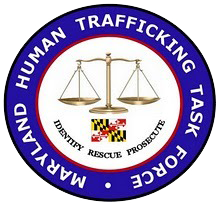State Agencies
State agencies have a vital role in responding to human trafficking; they reach every part of Maryland in a way that nonprofits and other organizations do not. Agencies can significantly impact victims who enter into state care and supervision. Victims and traffickers will no longer remain anonymous as agencies research, develop, and deploy risk assessment tools and screening questions to identify them. As state agencies begin to institutionalize effective victim identification, the next step will be to develop appropriate service response. Due in large part to coordination through the Maryland Human Trafficking Task Force (MHTTF), Maryland has a comprehensive network of nonprofit service providers ready to partner with state agencies to rehabilitate trafficking survivors.
The Department of Human Resources (DHR) and the Department of Juvenile Services (DJS) are tasked with defining how they will care for juvenile victims of domestic minor sex trafficking (DMST). Both agencies are committed to deploying risk assessment tools to identify victims and developing partnerships with providers to serve those victims. DHR and DJS must negotiate the intake, placement, and safety of juvenile victims who may be hostile and suspicious of care following consistent abuse of traffickers who instruct them that government agencies will not help them because of the criminal sexual acts that they have done. In partnership with MHTTF, DJS has begun to pilot a risk assessment tool at its female youth detention facility, Thomas J.S. Waxter Center. Maryland plans to customize the DJS tool within DHR and other relevant agencies that may have victims in their care.
The Department of Public Safety and Correctional Services (DPSCS) is tasked with defining how it will identify adult victims and gather intelligence on suspected traffickers within Baltimore Central Booking and Intake Center, state correctional facilities, and community supervision. DPSCS has authority over diverse points in the criminal justice system that are rich for gathering valuable intelligence on traffickers and organized trafficking. As DPSCS develops risk assessment tools and screening questions, DPSCS staff will become an integral partner in MHTTF investigations. DPSCS plans to devote specialized intelligence personnel to MHTTF to tighten collaboration with prosecutors, law enforcement, and correctional administrators at all levels of government.
The Maryland State Police (MSP) has provided key leadership in shifting the law enforcement community’s response from one of criminalizing the victim to a victim-centered approach. MSP’s Computer Crimes Section routinely conducts proactive operations focused on trafficking and victim assistance. When the National Center for Missing and Exploited Children (NCMEC) receives a tip regarding a potential case of trafficking in Maryland, MSP’s Computer Crimes Section is their point of contact. MSP troopers encounter victims of trafficking routinely during calls for service, traffic stops, requests to assist DHR, and investigations. In order to identify victims, MSP utilizes resources made available to them by MHTTF to examine cases for signs of trafficking. All MSP sworn personnel receive training on trafficking as a part of entry level training and additional trainings are held throughout the year. Moving forward, MSP will expand existing efforts and draw on the resources of the Maryland Coordination and Analysis Center (MCAC), Maryland’s fusion center, to enhance data collection on the scope of human trafficking in Maryland and promote effective intelligence sharing among all stakeholders.
